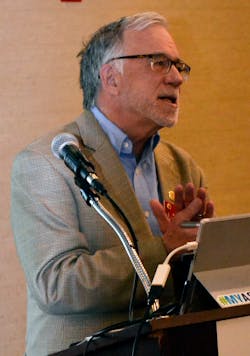For more than 40 years, Tim Wentz has worked as a mechanical contractor, educator and heating and cooling engineer, with some of those years devoted to working for a chapter of the American Society of Heating, Air Conditioning and Refrigeration Engineers (ASHRAE), and as an expert witness in court disputes. During a recent address to the Cleveland, Ohio Chapter of ASHRAE, Wentz spoke on the relationship between risk and ethics.
“We all face the same problems in terms of ethics,” Wentz told the audience of Northeast Ohio commercial contractors gathered for an installment in the ASHRAE Distinguished Lecturer Program, and many in the room agreed. “This includes, trying to get paid fairly for the work we do; trying to account for changes, which are inevitable in design and construction; and getting paid in a timely fashion.” But whatever happens, Wentz said, contractors must hold fast to their individual codes of ethics, and never retaliate unethically.
A Common Problem
Wentz said mechanical contractors are burned disproportionately by unethical practices. “There are many small companies in our industry, and a lot of under-capitalized firms in our industry, and it’s an industry that’s easy to enter,” he said. “For example, if you want to be a contractor in the state of Nebraska, you fill out one form, pay $25, and voila, you are a contractor. That’s not right, but that’s the industry we have in many different places.”
Hold fast to your individual code of ethics, and never retaliate unethically.
Wentz explained that contractors, who on occasion take risks, must be good risk managers, to guide the team through various contracts and negotiations. Being successful in handling risk requires dealing with it with integrity, in what is very much a people-based industry. “If your firm is to be successful, it willHe shared the findings of a 2005 Harvard study (Kotter, Heskett) that charted the success of firms that “obsessively” meet the needs of customers. They found that revenue increased four times faster; job creation increased seven times faster; and owner equity rose 12 times faster than it would have increased without strong commitments to meeting customer needs.
“But what really caught my eye, was that profit performance increased 750 percent in 11 years,” in the firms that were obsessed with meeting expectations, Wentz revealed.
Owners of HVACR contracting businesses realize they will have to take occasional risks, but they must be taken with integrity. Wentz said risk management failures fall into three categories:
1. Those that fail to differentiate between “can” and “should,” which are related to technical issues.
2. Those that follow a minimum standard, which are related to legal issues.
3. Those based on risk avoidance, which is often an ethical issue.
He then described three cases in which he served as an expert witness on behalf of three commercial contractors. Space prevents me from describing each case in detail, but they involved a handshake rather than a signed document; non-disclosure of a daily late fee; and designing a louver with an obscene gesture that faced a homeowner who demanded his neighbor's roof be lowered by six inches, to meet the code of a housing association.
The bottom line, as Wentz explained, is that contracting firms must create high-performance cultures, by:
- hiring clients and employees that fit their performance culture and ethical culture;
- promoting and supporting strong, ethical decision-making;
- including that instruction in employee orientations, mentorships and internships;
- employing non-monetary Key Performance Indicators that model the behavior you're trying to achieve, and set expectations;
- Take a Six Sigma approach: What does the customer want? Identify the issues that prevent you from meeting client expectations; summarize key issues; and translate those into specific, measurable requirements.
Silver & Gold
Wentz advised the audience to rank clients as "silver" or "gold" in terms of compatibility.
"Gold clients pay on time, they negotiate the work, and result in the most profitable projects," he said. "With 'silver' clients, not all projects are perfect, but most are, and they're good people to work with. Silver clients can be nurtured to become 'gold' clients."
"Make your go/no go decision unique, apply it prior to the decision to proceed, include an ethical basis for the decision, put it in writing, and apply it to every project," Wentz said.
Wentz suggested contractors begin using a "go/no go" process that tells them, "Yes, this is our kind of job. Yes, we can make money on it, and yes, we can nurture the client to achieving 'gold' status. "This will help to make your firm stronger, and help you avoid some of the 'lead' clients that are out there," he counseled. "Make your go/no go decision unique, apply it prior to the decision to proceed, include an ethical basis for the decision, put it in writing, and apply it to every project," he said.
About the Author
Terry McIver
Content Director - CB
As director of content for Contracting Business, he produces daily content and feature articles for CB's 38,000 print subscribers and many more Internet visitors. He has written hundreds, if not two or three, pieces of news, features and contractor profile articles for CB's audience of quality HVACR contractors. He can also be found covering HVACR industry events or visiting with manufacturers and contractors. He also has significant experience in trade show planning.

